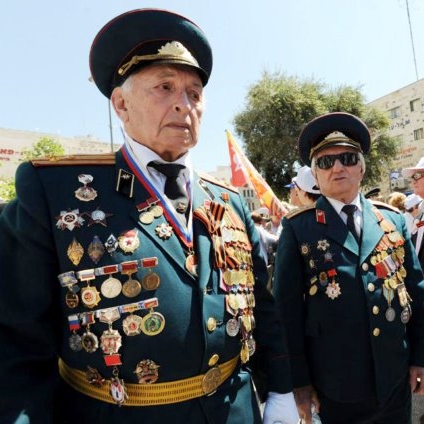
World

Fighting to preserve a victory
PAULA SLIER
I stopped my car, jumped out, and ran over to him. “Sir, I want to thank you for what you did,” I said, tears welling up in my eyes as his crinkled, ancient face looked up at me. His brown eyes immediately filled with tears of their own as he shakingly took my hand and kissed it.
“Sbasiba, sbasiba,” I kept repeating the Russian word for “thank you”. As he puffed out his chest, he told me his name was Sasha. For hours he sat alone on that boardwalk in the early morning of May 9, paying silent homage to the victims and heroes of the Soviet Union’s victory over Nazi Germany 72 years ago in the Great Patriotic War.
Throughout that Tuesday of May 9, the day the war with Nazi Germany officially ended, dozens of Second World War Soviet Red Army veterans – many of them over 90 years old – gathered in commemorative events across Israel. Each of them proudly donned his or her medals, while many held photographs of sons, brothers and fathers killed in action.
Amid the larger tragedy of the Holocaust, these are some of the one-and-a-half million Jews who fought in Allied armies against the Nazis. According to Yad Vashem, a quarter of a million of them died in battle or fell into German captivity – most of them soldiers from the Red Army.
Those who survived built a life after the war in the former Soviet Union and when it collapsed in 1991, many of them emigrated to Israel. Today only some 5 000 are still alive in Israel and receive medical and financial benefits from the State. But it wasn’t always this way.
Only in the last two decades has Victory Day been officially recognised by Jerusalem. For years Israeli schools taught that it was the United States that won the war on May 8, ignoring the fact that it was actually the Red Army that liberated almost all the large concentration camps.
“What is important to acknowledge is not only people who died in the concentration camps and battles,” a Russian Member of Parliament told me, “but to remember the importance of victory. Our parents and grandparents were victors and that’s what former Soviet Jews have brought to Israel – the meaning of this victory.”
But, as Napoleon Bonaparte once observed, it is the winners who write history.
Two years ago, the Polish government saw fit not to invite Russian President Vladimir Putin to attend the 70th anniversary of the liberation of Auschwitz. The Polish foreign minister explained that “the first soldiers who stood at the frontline and were responsible for the release of the concentrations camps, were Ukrainian”.
What he failed to point out is that they were part of the Soviet Army as were countless other nationalities – Poles, Russians, Byelorussians, Kazakhs, and more. But politics is politics and with Polish-Ukrainian-Russian relations now seemingly ruptured beyond repair, Red Army veterans have been encouraged not to wear their medals in public in Ukraine and civilians have been attacked for marching in support of the Soviet victory in 1945.
In Ukraine, the honouring of the Red Army is seen as tantamount to supporting Russia. Of course, this is heart-breaking to many war veterans for whom the memory of that common fight is too strong to be suppressed and the sense of pride in its victory too powerful to forget.
Behind closed doors, inside a Soviet-built Kiev apartment, 90-year-old Boris Israel tells me he was not only surprised but also humiliated by the announcement.
“Our pride is hurt,” he whispered, the tears falling down his cheeks. “We were fighting for the sake of the Soviet people and almost every family in the post-war Soviet Union has people who died during the fighting. It’s extremely important for us to celebrate the day,” he reflected sadly.
As we sat around a tiny table in his living room, Israel opened a bottle of vodka and poured generous helpings for the camera crew. We drank while chewing on dark chocolate. Israel fought in the Siege of Leningrad after the Germans imposed a prolonged military blockade against the city for 872 days. His mother died of starvation.
“It’s always been a dream of mine to go to Israel,” he enthused and a month later his daughter phoned me to ask if I could help with travel arrangements.
Another veteran, Avraham, who once headed up the Union of World War Two Veterans in Israel, told me: “Life in Israel isn’t easy. Our grandsons are serving in the Israeli army as officers and soldiers and they are serving as honestly as we did all those years ago. Victory has to be preserved – everybody needs peace – the old and the young.”
His eyes too filled with tears as he recounted religious Jewish children once pointing to his medals and asking how much they cost.
“This is how much they know about the war,” he groaned quietly. “I told them you can buy these medals… but the price is blood.”
Which brings me back to Sasha, that dear sweet old man on the Bat Yam Boulevard. He didn’t speak a word of English and I know no Russian. So, we bonded in Yiddish. “Zei gezunt mein kind (“Be healthy my child”) he blessed me as we hugged and both smiled at the memory of a bittersweet victory still fighting to be preserved.
Paula Slier is the Middle East Bureau Chief of RT, the founder and CEO of NewshoundMedia and the inaugural winner of the Europcar Woman in Leadership Award of the South African Absa Jewish Achievers.




